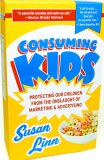Summary | Excerpt | Reading Guide | Reviews | Beyond the Book | Readalikes | Genres & Themes | Author Bio

Critics' Opinion:
Readers' Opinion:
First Published:
May 2004, 256 pages
Paperback:
Aug 2005, 304 pages
 Book Reviewed by:
Book Reviewed by:
BookBrowse Review Team
Buy This Book
The advertising industry's spin is that parents—not corporations—are responsible for preventing the negative effects of media offerings and media marketing on children. Certainly there are things parents can do. For one thing, we can take televisions and computers out of our children's bedrooms. We can turn the television off during meals. We can monitor our own consumerism and talk with children about the meanings embedded in marketing messages. But parents can't do it alone. One family is hard-pressed to successfully combat a $15 billion industry. Parents and children need our help—as citizens, professionals, advocates, and activists.
The impact of corporate marketing on children's lives is breathtaking in its depth and reach and is expanding around the world virtually unchecked. This summer I sat in a restaurant in Santiago, Chile, surrounded by both Chilean families and posters of Barbie saying "Welcome" in a variety of languages. A few years ago, when my work took me to Tblisi, in the Republic of Georgia, I arrived during the grand opening of their second McDonald's. In the course of my research, I've come across studies of the buying habits of Chinese children and the impact of advertising on kids in India. I receive daily e-mails from colleagues around the country detailing marketing efforts ranging from the subtle (Coca Cola's million-dollar grant to the American Academy of Pediatric Dentistry, for instance) to the blatant (the summer "camp" program that Toys "R" Us now runs in its stores).
Because marketing to children is so pervasive and affects so many aspect of their lives, my major struggle in writing about it has been in selecting topics and, of necessity, eliminating others. While marketing to children is an international problem, I have chosen to focus my attention on its impact on children and families in the United States because that's what I know best. Other books center specifically, and in detail, on single topics such as commercialism in the schools, for instance, or selling violence to children, or the effects of advertising on young girls. Instead, I've chosen to write about marketing from the perspective of what early childhood educators call "whole child development," taking the position that children are multifaceted beings whose physical, psychological, social, emotional, and spiritual development are all threatened when their value as consumers trumps their value as people.
While trying to find a home for this book, I encountered a lot of initial interest that rapidly diminished. Most publishers wanted me to write a "how to" book for parents. They envisioned a book entitled something like Empowering Families: A Twelve-Step Program for Raising Advertising-Resistant Children. That was not the book I had in mind, and so it was a relief when André Schiffrin at The New Press called and said, "I'm concerned that your book proposal is a bit too prescriptive."
Given that, I recognize that it's unfair to describe in gory detail the depth and breadth of how marketing affects children without offering some specific suggestions for what to do about it in both the short and the long terms. There are steps we can take as parents, as members of a larger community, and as citizens to stop the commercial exploitation of children. I outline these in chapter 12. I've also included a list of resources for public action. Throughout, I refer to the people taking care of children at home as parents. I mean that term to include grandparents, guardians, and anyone who has primary responsibility for raising a child.
I've never heard anyone, aside from an occasional marketing executive, say that advertising to children is good for them. And there's mounting evidence that it's harmful. Its motivating force is greed, just as surely as greed is the motivation for those corporate executives who cannibalize their own companies, create sweatshops, and artificially inflate consumer energy costs.
From Consuming Kids by Susan Linn, pages 1-10. Copyright Susan Linn 2004. All rights reserved. No part of this book maybe reproduced without written permission from the publisher, The New Press.





The Flower Sisters
by Michelle Collins Anderson
From the new Fannie Flagg of the Ozarks, a richly-woven story of family, forgiveness, and reinvention.

The House on Biscayne Bay
by Chanel Cleeton
As death stalks a gothic mansion in Miami, the lives of two women intertwine as the past and present collide.

The Funeral Cryer by Wenyan Lu
Debut novelist Wenyan Lu brings us this witty yet profound story about one woman's midlife reawakening in contemporary rural China.
Your guide toexceptional books
BookBrowse seeks out and recommends the best in contemporary fiction and nonfiction—books that not only engage and entertain but also deepen our understanding of ourselves and the world around us.